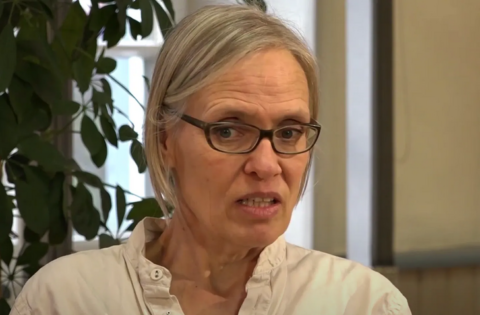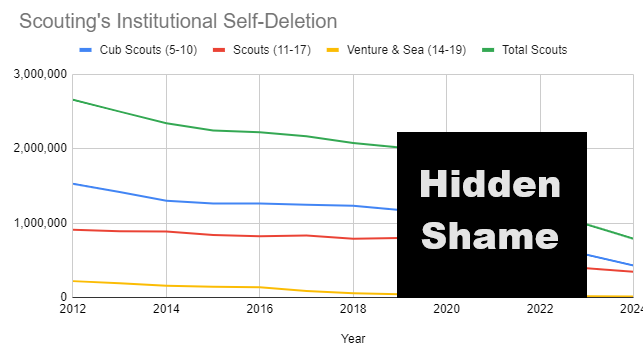My initial impression is that the Juggs operate like the commies do/did. Fill in the boxes, even if nothing makes sense. Don’t take responsibility. It’s how one somehow gets a Brandon at the top.
The Trump movement does have some real [historical Nazi] characteristics. Many low-level people feel remarkably empowered to do things, to get creative to help the cause (and also make some coin; how many Trump medals, flags, and coffee cups does one buy?), and to get out there and just stir the pot for the Orange guy. Then we saw The Donald at the top not exercising real power, other than to exhort others to get shit done, whatever unnamed shit that needed doing.
My first run-through suggests that calling the Juggs and their minions “filthy commies” actually is not just a kneejerk response, but it lands mostly true, in the ways that matter. The Jugg argument that Trump and his people are a bunch of Nazis also has some real truthy elements to it as well (though the true elements are generally probably far afield from the Nazi stuff the Juggs have in mind).
Commies and Nazis gain traction when the basic job of governance is found lacking, and the caliber of people tasked with getting things back in line is not up to the task. Then the various totalitarian solutions become more popular. Even when the intentions are pure (I will give most of the Trump people that assumption), unfettered ambitions, allowed to flower, will go bad if the normal checks and balances of the system are all out of whack. It is just human nature.
Our systems are all out of whack. That is why AOC can call for impeachment of [six US Supreme Court justices] with a straight face, and there is no broadly based “hey, wait a minute, Bucko” response. Things might be too far gone, and there is no way to pull back into a system that actually well serves the average American (think of what constituencies the typical elected official actually serves — the deep state apparat, the ultra-rich guys, and the corporate lobbyists). It all means the Trump movement is a tool, not to restore something, but to accelerate the “get through it and start afresh”. With that in mind, the November results tend to be more of “six of one, half a dozen of the other” than people think they are.
“Dutch”, commenting on “How Juggs Think the World Works”, Founding Questions, 2024-07-02.
October 3, 2024
QotD: Historical echoes in the American left and right
September 30, 2024
Saving German democracy seems to require not following the law for some reason
[Update below] I’m sure that Germany is being well-served by their politicians who only seem to want to obey the law when it suits them. I mean, that’s how you save democracy, right? By ignoring democratic laws for a “higher good” every now and again?

Jürgen Treutler, the supergenius fascist who discovered that all you need to do to establish fascism is follow all democratic laws and procedures rigorously and to the letter.
They never tire of telling us that we live in a democracy.
This means that that dreaded mass known as “the people” are permitted – with however much groaning and reluctance – to present themselves every four years to choose their representatives. These representatives then betake themselves to the parliament, where they form some manner of government, which proceeds to rule us in highly democratic ways. This is is literally the best thing ever, except for the fact that “the people”, in their profound stupidity, cannot always be relied upon to vote for the right parties. Sometimes they vote for the wrong ones, and in these cases democratic solutions must be found to rein in the rabble’s undemocratic exercise of democracy.
The people of Thüringen have proven themselves particularly inconvenient to democracy, in that they have exercised their democratic rights to vote overwhelmingly for the evil, fascist and antidemocratic party known as Alternative für Deutschland. What makes the AfD so evil and fascist is never quite explained, but we hear all the time that they are very bad so the point must be beyond question. The people of Thüringen transgressed against democracy so powerfully, that they gave the AfD 32 seats of their 88-seat state parliament – far more than they granted to any of the upstanding, democratic parties. These parties include such paragons of democratic virtue as Die Linke (the Left Party), which somehow manages to be both officially democratic and also the direct successor to the DDR-era Socialist Unity Party (they got a mere 12 seats); the Linke-offshoot party known as the Bündnis Sahra Wageknecht (they got 15 seats); the Christian Democrats (they got 23 seats); and the Social Democrats (they got 6 seats, lol).
Now, a naive person might think that the AfD, being the party most favoured by the people of Thüringen, should enjoy certain parliamentary prerogatives. Existing procedures, for example, grant the strongest party the right to propose candidates for the office of parliamentary president. The president is the person who presides over the meetings of the parliament; he is like a glorified committee chair and his powers are not all that great. The very idea that the AfD might have the right to suggest their own candidates for president, however, strikes enormous fear into the hearts of the “democratic” parties, who are determined to save Thuringian democracy by all the antidemocratic means at their disposal. If necessary, we must destroy democracy itself, to save the Thuringian parliament from the spectre of a democratically elected AfD president.
This brings us to the absolute unprecedented clownshow that unfolded yesterday at the Thuringian parliament in Erfurt. It was set to be a day of boring, routine procedure, when the newly elected parliament would constitute itself and elect a president. Thüringen is anomalous, in that this state – alone of all the federal states of Germany – has a specific law mandating adherence to parliamentary procedures. New parliaments cannot just change these procedures on the fly; they have to be officially constituted as a legislative body first. These legally mandated procedures require that an acting “senior president” preside over the first meeting of the new parliament. This senior president is simply the oldest member of the dominant party – in this case an affable rotund AfD politician named Jürgen Treutler.
Update: eugyppius updates the state of play in Thuringia after the relevant court rules that the law can be set aside in this case:
In not-so-good news (but as I predicted), the state constitutional court in Thüringen ruled in favour of the CDU last Friday. The other parties were able to change the procedural rules in the Thuringian parliament and exclude the AfD not only from the office of president, but also from the entire executive committee of the Landtag. The “democratic” parties have also altered procedural rules to reduce AfD representation on parliamentary committees, effectively preventing the strongest party in the Landtag from exercising their blocking minority there.
They really are determined to destroy the democracy to save it.
September 27, 2024
Ronald Reagan never said this … but Karl Marx did
At The Take, Jon Miltimore discusses a fake Ronald Reagan quote-on-a-poster being sold through Amazon and reveals that the quote actually originates with Karl Marx:
For just $9.99, people can go on Amazon and buy wall art of Ronald Reagan apparently defending the Second Amendment.
“Under no pretext should arms and ammunition be surrendered,” the text reads next to a picture of Reagan; “any attempts to disarm the people must be stopped, by force if necessary”.
There are a few problems with the quote, but the biggest one is that Reagan never said it.
As numerous fact checkers have noted — including Reuters, Snopes, Factcheck.org, and Politifact — the author of the quote is none other than Karl Marx, the German philosopher and author of The Communist Manifesto who used language nearly verbatim to this in an 1850 address in London.
“Under no pretext should arms and ammunition be surrendered; any attempt to disarm the workers must be frustrated, by force if necessary,” Marx said in his “Address of the Central Committee to the Communist League“.
Marxists Not Embracing Marx’s Messaging?
In fairness to the many internet users duped by the fake Reagan meme, the quote sounds a bit like something Reagan could have said (though it’s highly unlikely the Gipper, a skilled and careful orator, would have ever said “by force if necessary”).
Reagan, after all, generally — though not universally — supported gun rights and was skeptical of efforts to restrict firearms.
“You won’t get gun control by disarming law-abiding citizens,” Reagan famously noted in a 1983 speech.
Some might be surprised that Marx and Reagan had similar views on gun control. Marx was of course the father of communism, whereas Reagan was famously anti-communist. Moreover, Marx’s modern disciples are staunch supporters of gun control, whether they identify as socialists or progressives.
“Guns in the United States pose a real threat to public health and safety and disproportionately impact communities of color,” Nivedita Majumdar, an associate professor of English at John Jay College, wrote in the Marxist magazine Jacobin. “Their preponderance only serves corporate interests, a corrupt political establishment, and an alienated capitalist culture.”
This distaste for guns goes beyond socialist magazines. As The Atlantic reported during the 2020 presidential election cycle, progressive politicians are increasingly embracing more stringent federal gun control laws.
“No longer are primary candidates merely calling for tighter background checks and a ban on assault weapons,” journalist Russell Berman wrote; “in 2019, contenders like Senator Cory Booker of New Jersey and Representative Beto O’Rourke of Texas were calling for national licensing requirements and gun-buyback programs”.
The point here is not to disparage politicians like O’Rourke and Booker as “Marxists”, a label they’d almost certainly object to. The point is that progressive politicians like Rep. Alexandria Ocasio-Cortez (D-NY) might channel Marx in their class rhetoric, but they are not embracing his messaging when it comes to the proletariat’s access to firearms.
As it happens, this is a common theme with Marxists throughout history.
September 26, 2024
The government is too big to let Donald Trump get his hands on it, so here’s what we do …
Chris Bray finds himself — surprisingly — agreeing with someone he previously dismissed out-of-hand, even writing that “father-of-anti-Trump-lawfare Norm Eisen as a fool, a sad sack, and the central figure in ‘a George Grosz painting come to life’.”
America, I was wrong. Norm Eisen is a genius, and I declare myself to be his political ally.
Eisen is circulating a “No Dictators Declaration”, and asking elected officials to sign on to the thing. He warns that the federal government is dangerously large and powerful, and the ORANGE DEVIL may return to the presidency and use all that power, and so we have to limit the power of the federal government as much as possible so we can protect against Dictator Trump. It’s quite rare to see a former Obama administration official, a longtime progressive activist and D.C. insider, arguing in public that the federal government is dangerous and should have much less power. And, look, what can I possibly say against that? I concede. Norm Eisen is right.
Let’s look at the details:
- To reduce the threat of dictatorship, Congress should limit the president’s ability to declare bogus domestic and foreign emergencies to seize power and bypass Congressional legislative authority.
- The U.S. currently has 42 national emergencies declared, some decades-old. Under emergency powers, a president can claim the authority to divert funds, seize property, and bypass Congress.
This is terrifying, see, because Trump might use those extensive emergency powers that are very good and progressive when every other president uses them. So the progressive Norm Eisen wants to sharply limit the power of the President of the United States to declare emergencies without congressional authority. You know, to stop Trump.
I … uh … yes? We definitely need to stop Trump by making it almost impossible for a president, or for any executive branch official, to unilaterally declare an emergency that confers substantial authority on federal officers. I’m especially worried that Trump might use public health emergencies to be a dictator, so we should restrain this very frightening man Trump with immediate and permanent restrictions on the emergency public health powers of the federal government. Imagine a dictator using the authority of an Anthony Fauci figure to impose a lot of harsh restrictions on Americans! That … would be scary … if … Trump did that.
- To reduce the threat of dictatorship, Congress should ensure that presidents who abuse their powers to commit crimes can be prosecuted like all other people.
Again, Eisen just absolutely nails the danger that Donald Trump poses, and I agree. We should ensure that any President of the United States who might abuse their power in order to commit crimes can be sent to prison. Like, hypothetically, if any POTUS ordered a drone strike that killed a US citizen who was a minor and not a terrorist, or sent his own son out to gather cash from foreign powers in exchange for political influence, we would for sure want to send that president to prison. To stop Trump, I’m saying. This is a great idea, Norm Eisen. We should make it much easier to prosecute presidents, and I have a whole list right here, ready to go.
September 25, 2024
Freddie deBoer on “deference politics”
In the first of a series of articles, Freddie deBoer discusses the phenomenon of “deference politics” practiced by many (most?) progressives in the United States (and equally in Canada):
When I talk about deference politics, I’m referring to the tendency of left-leaning people to substitute interpersonal obsequiousness towards “marginalized groups” for the actual material change those groups demand.
If you’ve lived in any left-aligned spaces in the past decade, you’ve encountered deference politics many times. A white person in a humanities seminar, an organizing meeting, an industry convention, a workplace gathering, etc., who makes the conscious decision to avoid engaging or to engage from a position of proactive apology towards various identity groups is engaged in deference politics. Someone who insists that members of “dominant groups” should censor themselves or speak softly or avoid speaking too much or defer to or otherwise “make space” for members of minority identities is advocating for deference politics; someone from a dominant group who tells others in that group that they should defer is practicing (self-aggrandizing) deference politics. “Maybe men should just shut up for awhile,” voiced by a man, is quintessential deference politics. “I sat my white ass down and listened” is deference politics. “Teach me how not to oppress you,” spoken at an academic conference by a straight person to LGBTQ people on a panel, is deference politics. Avoiding sharing a challenging opinion on an issue of controversy for fear of running afoul of the wrong kind of identity accusation is deference politics.
The infamous image above, of Democratic leaders wrapped in kente cloth and taking a knee in memory of George Floyd, actually preceded a meaningful attempt at material change, the George Floyd Justice in Policing Act. While that bill would not have been a sufficient overhaul of America’s criminal justice system — it’s hard to use the federal government to reform policing, which tends to be governed by state policies and influenced by local conditions — it would have been a good start. The Democrats, sadly, were not able to pass the bill in two tries, though perhaps it could still be revived. That the party simply didn’t have the votes to make the bill law isn’t something that we should be particularly hard on the Democrats about, but the contrast between its failure and the theatrics that attended its announcement is deference politics in its essential form: at a moment of mass discontent over the state of race and policing, Black Americans got the absurd performance from Congressional leaders but not the substance of better policy. And this is core to the critique of deference politics; the point is not that the good intentions of the people who practice them are worthless but that the people who practice deference politics never seem to recognize that all of the deferring never makes positive action more likely. Like many great political crimes, deference politics privileges the communicative and the emotional over the material and the actual.
It’s important to point out that many Black activists and writers recoiled at the deference politics practiced after George Floyd’s death and pointed out that they had never asked for such theatrics.
Is “deference politics” just a way to say “woke”?
No. Deference politics could conceivably be practice or demanded in any given political context and by members of any given political tendency. Conservatives do occasionally advocate for deference politics, such as when they insist that only veterans should comment on issues of war and peace. Nor do woke people assertively practice deference politics all the time; in fact, for various demographic reasons most people practicing social justice politics are themselves members of dominant groups, and they have a tendency to assert their own superior right to speak rather than to defer to others. The term “deference politics” should likewise not be used to refer to all cringey elements of “allyship”, which involves a diverse suite of questionable tactics and attitudes, but certainly deference politics are core to the behavior of the modern ally. The practice epitomizes the modern liberal obsession with defining politics as a matter of interpersonal niceties rather than as the systems through which human values are expressed in material terms in the real world.
September 23, 2024
In Toronto, school kids are being used as pawns in political protests
The Toronto District School Board has some serious issues if a recent high school “field trip” to a political protest is typical of how the board’s employees are allowed to insert their own political agenda into the teaching process:
There were some parents who opted out of allowing their children to participate in a Toronto District School Board (TDSB) sanctioned field trip to observe (not participate) in a public protest. Parents were informed that the event at Grange Park in Toronto involved the Grassy Narrows First Nation’s decades-long struggle with mercury contamination caused by industry. However, they should have taken this proposed field trip as a major red flag. Indeed, according to Spadina-Fort York MP Kevin Vuong, “What the TDSB teachers did was deceitful and unconscionable”.
When I was a kid, my school never attended a protest. And before last Wednesday, I’ve never heard of any school ever planning such an inappropriate field trip – that ended up being used by the ultra-woke TDSB as an excuse to indoctrinate children into social justice activism (which entails the labelling of all white/Jewish children as racists, colonizers, and settlers on stolen land). How many TDSB parents were even aware of what they were signing up for? It appears that many knew of the general shape of things – which had something to do with Grassy Narrows and mercury poisoning – but no parent could have known about the anti-Israel / anti-Semitic component (a mainstay of social justice), which appeared to be the focal point, eclipsing anything to do with Canadian First Nations.
Indeed, the email from the TDSB explained that the protest event was an “educational opportunity … to learn about Indigenous activism, environmental justice and human rights”. The red flag would have been enormous and flapping vigorously in a strong wind for those parents who are initiated into the tenets of critical social justice theory. To those parents, participation in woke activism is a hard hell no. However, many families are still oblivious, or maybe have misunderstood the intentions of the TDSB, or maybe just don’t quite get what critical social justice is. They are unaware that far too many school administrators, trustees, and teachers have decided that their priority is transforming society through a cultural revolution, not educating the young. This, of course, involves transforming children.
The letter to parents assured them that their children would not be participating in the protest. Students would be on site only to observe. However, videos have emerged on social media of middle school aged children marching alongside anti-Israel protestors. Understandably, many parents now feel betrayed. In my view, they should have seen this coming. The TDSB is literally infested with anti-Semetic black radicals and other such woke activists who follow the same identity politics playbook which entered North America through the period of violent 1960s era black radicalism. (I refer the reader to Cedric Robinson’s volume Black Marxism: The Making of the Black Radical Tradition. And, to Dr. Scott Miller’s essay published in these pages “A Moral Chimera: Diversity, Illiberal No-White-Male Policies and the Power of the Black Radical Tradition“. And lastly, if you want to see black radicals in action, read my piece, “Exploring The Grievance Pathway Of Anti-Racism“, on a Parents of Black Children meeting I attended).
Concerning those videos of the protest which circulated social media sparking outrage amongst parents, according to the Toronto Sun, “footage showed students marching alongside flag-waving Elementary Teachers of Toronto members, while a masked woman in a white ‘Justice for Grassy Narrows’ shirt shouted anti-Israel chants into a megaphone”.
CG Idit Shamir (Consul General @IsraelinToronto) posted the following to X (I completely agree with her sentiment):
“Shocking. 7th and 8th graders from public schools in Toronto were taken yesterday on a Toronto District School Board (TDSB) -approved field trip—not to a museum, but to march in a political protest where they chanted pro-Palestine slogans. Adults in keffiyehs and face coverings led the way, while young minds were subjected to a one-sided political narrative.
“The @tdsb has crossed a line. Children get sent to school to learn; they should NEVER be forced to participate in political protests. It’s not just that they’ve taken a side—it’s that they have utterly disregarded the rights of pro-Israel and Jewish students and staff, along with any commitment to truth and balance. This isn’t education; it’s indoctrination—it’s an affront to the very purpose of education.”
MPP Goldie Ghamari, also had a strong reaction:
“What the actual f**k is going on with @tdsb educators in Toronto?
This isn’t 1944 Nazi occupied Germany.
This is 2024 in Canada.
This antisemitic behaviour is unacceptable.
If you stay silent after reading this, you’re part of the problem and need to hang your head in shame.”
Berlin’s Der Tagesspiegel wants to help you keep your kids from the perils of right-wing ideology
eugyppius on the help Berlin’s leading daily newspaper is offering to their readers whose kids are hearing the siren call of non-progressive politics:
This obviously charming, cheerful and not at all withered or overwrought woman is named Eva Prausner. She is a social worker, and she directs something called the “Project for Strengthening Parents“, which provides “Training, networking, and counselling in the area of family and right-wing extremism”. This means that she runs around telling parents what to do when they suspect their children are succumbing to political wrong-think. And this in turn makes Frau Prausner the woman of the hour, for never before in the history of the Federal Republic have so many undemocratic children bloomed under the noses of so many upstanding democratic parents.
It is very hard to understand how this happened. The leftists and the Greens, after all, have been doing the Lord’s work teaching leftism and Greenism in schools for decades now, but despite their valiant efforts we are rapidly losing our youth to malign antidemocratic forces. It can’t be that elevating leftoid lunacy into an establishment ideology has backfired, transforming the once cool, counter-cultural left into a political movement for middle-aged scolds and schoolmarms – the kind of thing from which teenagers flee in terror. No, nothing could be less plausible. The real reason for the pandemic of right-wing children must simply be that we haven’t indoctrinated them enough. If parents will not do their part and bring indoctrination also to the home, our democracy will collapse and it will be 1933 all over again, just like it was 1933 all over again two weeks ago after the elections in Thüringen and Saxony.
For these reasons, Der Tagesspiegel, Berlin’s largest daily newspaper, interviewed Prausner on her advice for parents who find themselves forced to deal with their evil, right-leaning spawn. The product is a prescient write-up for the ages bearing the headline “Help, my child is turning right-wing! Eight tips for democratic parents with undemocratic children“.
The rightward shift in East Germany is a shift above all among the youngest, as the elections in Saxony and Thüringen have shown. One in three young people there voted for the far right. In Thüringen, as many as 38% of 18- to 34-year-olds cast their ballot for the AfD – more than in any other age group. Many a parent who values living in a democracy will have wondered: “What have we done wrong?”
In Brandenburg, too, it is becoming clear that even the youngest are now leaning towards the right. In the under-16 vote a week before the state election, the AfD came out on top with around 30% … In the state elections on 22 September, the AfD could become the strongest force, thanks in part to young first-time voters.
Do parents still have any influence over their AfD-voting children?
Alas, Prausner is not very certain that they do, but she believes that democratic parents “should at least try” to rescue their children from the grave heresy of voting for the wrong political parties. Children in Brandenburg are particularly endangered, because Brandenburg is largely rural, and Prausner has discovered that the countryside is absolutely dripping with “condensed prejudicial attitudes”. There is so much racial prejudice in the Brandenburg air that it is collecting on cool surfaces, like windows and beer glasses, that is how bad things are there. Also all children everywhere are in danger because the internet is a powerful right-wing force that helps bad organisations like the AfD pump their fascist mind virus directly into millions of young yet-forming cerebral cortices.
September 21, 2024
September 19, 2024
QotD: “Solutions” to climate change
Everyone who isn’t an idiot knows the climate change hoax was never about “science”. That’s a hack lie they use to shut you up when you point out that the ice age, floods, and mass polar bear die-offs they are always promising never, ever seem to happen. It’s a deliberate scam that blends leftism, hysterical hyperbole, and outright fraud into a gooey pudding designed to fill the spiritual void in empty-souled western suckers while providing a tool for our global leftist establishment to steal more of our money and freedom.
Quick: name a climate change remedy that does not result in you being less free and/or paying more money. It’s actually remarkable. Every single thing that we absolutely must do right now no time to wait how dare you pause to think how dare you is something leftists always wanted but could never talk people into doing until the threat of weather vengeance started lurking around the corner.
You can’t name any. There aren’t any, because the weird climate cult is not about weather but about separating you from your liberty and loot. And, apparently, your life if you won’t obey.
Kurt Schlicter, “TIME’s Commie Nag of the Year Can Go Pound Sand”, Townhall.com, 2019-12-15.
September 5, 2024
Is the DEI tide finally receding from corporate boardrooms?
At the Foundation for Economic Education, Jon Miltimore explains why many major US corporations are reconsidering their earlier “all in” approach to lecturing their customers about progressive causes:

Bud Light’s brand ambassador, Dylan Mulvaney, whose antics triggered a consumer boycott that cost the company over a billion in lost revenue.
DEI is just one form of corporate social activism, which comes in various forms and includes its cousin Environmental, Social, and Governance (ESG). Both ideas fall under, to some degree, Corporate Social Responsibility (CSR), the idea that corporations have a duty to take social and environmental actions into consideration in their business models.
If you’re wondering why Burger King has commercials on climate change and cow farts, and why Bud Light’s commercials went from featuring Rodney Dangerfield and Bob Uecker to trans activist Dylan Mulvaney, it’s because of CSR.
The idea that corporations should fight for social causes has skyrocketed in recent years to such an extent that activism is inhibiting companies in their primary mission: generating profits by serving customers.
“Firms leveraging situations and social issues is not new, but showcasing their moral authority despite a disinterested consumer base is,” Kimberlee Josephson, an Associate Professor of Business at Lebanon Valley College in Annville, Pennsylvania, has observed.
Bud Light’s decision to feature Mulvaney cost them an estimated $1.4 billion in sales, and it revealed the danger of corporations leaning into social activism, particularly campaigns and policies that alienate their own consumer bases.
Not very long ago, companies like Chick-fil-A faced backlash from progressive activists for supporting traditional marriage. Culture war advocates on the right have responded in similar fashion.
Conservative influencers have made a point of raising awareness around “woke” corporate initiatives — white privilege campaigns, climate change goals, LGBTQ events, etc. The most successful ones, such as Robby Starbuck who pioneered the campaign against Tractor Supply and John Deere, made a point of targeting corporations with conservative consumer bases.
“If I started a boycott against Starbucks right now, I know that it wouldn’t get anywhere near the same result,” Starbuck recently told the Wall Street Journal.
One can support Robby Starbuck’s tactics or oppose them. What’s clear is that corporations increasingly face risks for participating in social activism campaigns, and the threats now come from both sides of the political aisle.
Respectful neutrality on cultural issues used to be the default way for companies to avoid insulting the general public and potentially alienating customers. Under the influence of DEI/ESG/CSR advocates, corporations were persuaded that they could offend half of the population without suffering any meaningful financial losses. That turned out to be untrue.
September 2, 2024
“Queering Nuclear Weapons” … no, don’t laugh because it isn’t funny
At Postcards From Barsoom, John Carter looks into what at first seemed like a less-than-brilliant headline from The Babylon Bee, but is actually a much more serious concern:
Nuclear security is, I’m sure you do not need to be convinced, a deeply serious matter. Ever since we cracked the atom over Hiroshima our civilization has been walking a tightrope over an abyss. A single misstep could mean annihilation – hundreds of millions dead within minutes, billions within days. Doubtless there would be some survivors, but it’s doubtful that industrial civilization would survive. We’ve come within a hair’s breadth of this a few times, not only in the Cuban Missile Crisis, but on other occasions, when radar mulfunctions or computer glitches left launch officers in the USA and the former USSR unsure whether or not to press the big red buttons they were entrusted with. Fortunately for everyone, they didn’t. If they had, none of us would be here.
Nuclear power plants can be almost equally dangerous. We saw the consequences of mismanagement in the 80s, with Chernobyl. Political officers who had no idea what they were doing covered up one screw-up after another. The results horrified a continent and poisoned the good name of the nuclear energy to this day.
Nuclear security, of civilian infrastructure and especially of the strategic weapons reserve, is the kind of thing that you want deeply serious men in charge of. The kinds of guys who wear impeccable grey suits, didn’t laugh because they don’t think your joke is funny, and have multiple degrees in military history and nuclear physics.
[…]
And now, here we are again. The Department of Energy’s new Special Assistant for National Nuclear Security Administration, one Sneha Nair, is also the author of an article titled Queering nuclear weapons: How LGBTQ+ inclusion strengthens security and reshapes disarmament.
The National Nuclear Security Administration is a semi-autonomous alphabet agency responsible, as its name implies, for maintaining the security and efficacy of the USA’s nuclear weapons stockpile. Its remit also includes preventing the proliferation of WMDs, overseeing the provision of nuclear propulsion for the US Navy, and responding to radiological emergencies.
These are not small things to be responsible for, and one of their newly appointed senior administrators is apparently obsessed with painting rainbows on the warheads.
Let’s have a look at her.
Unlike Brinton, Nair doesn’t obviously look like a spiteful mutant. No aposematic hair colouring, no facial piercings, no obvious tattoos, nor any other obvious signs of mental illness. Her Xitter account doesn’t even proclaim her pronouns.
So unlike Brinton, there’s no obvious evidence that she’s a sexual deviant. By all appearances, she’s merely another overly earnest head girl, looking to burnish her virtue via demonstrative allyship.
Most of the media coverage was just lol’ing at the woke absurdity of the title of Nair’s article – what could adult diapers, dildos, bugchasing, and Monkeypox possibly have to do with preventing the fiery nuclear annihilation of the human species? Aside, that is, from keeping the observably mentally ill as far from the big red button as possible? What fresh madness is this? But we’re all inured to the regime’s infinite absurdity, these days, so after having a sensibly cynical chuckle we all moved on. I shrugged and moved on myself, until a few days ago when Stelios Panagiotou of Podcast of the Lotus Eaters took the time to actually read Nair’s work. What he found wasn’t lolcow fodder. It was deeply sinister.
There’s no limit to how progressive politicians want to control your life
In the National Post a couple of days ago, Carson Jerema provided many examples of how the Canadian federal government — despite failing and fumbling so many of its existing responsibilities — still wants to increase control over the daily lives of Canadians:
After a decade or so, progressives are on the defensive in Canada and elsewhere because regular people, as in those who are not activist weirdos, are tired of the agenda to control every aspect of our lives. Point this out to a progressive, and they will deny that anyone’s life is being interfered with and claim only some far-right monster would think otherwise. They can’t believe there are people out there who share a different view. They don’t understand how this could be.
But progressive governments are trying to control our lives in ways big and small, and in ways that range from subtle to a punch in the face.
In Canada, the federal government’s environmental policies are the most obvious example of this interference. The Liberals have banned plastic straws and plastic bags; even compostable bags are banned in grocery stores because they resemble plastic. Such bans are pointless irritants that make shopping more expensive, and life slightly less enjoyable as paper straws dissolve in one’s drink. People might dismiss these concerns as simply minor inconveniences, but this is how most people experience government policy, by being forced to replace their bag of plastic bags that they were already reusing, with more expensive, less useful options.
Next up, the Liberals are exploring options to bring in environmental regulations for clothing. The cost of clothes has actually gone down in recent years, so leave it to Ottawa to look for ways to bring the cost back up and to limit options.
There is also the plan to essentially force Canadians to purchase electric vehicles, that nobody would otherwise want, through government mandates to phase out the sale of gas-powered cars and trucks.
On a larger scale, the government is attempting to restrict the kind of work people do, specifically work in the oil and gas industry, through steep emissions targets, which will close off lucrative job opportunities in western oilfields. It will also limit the kinds of fuels people will be able to use to heat their homes.
There are also policies that the Canadian government hasn’t implemented, but which green activists have endorsed, such as the banning of gas stoves and the ludicrous suggestion from some academics that “climate lockdowns” be implemented to help cut emissions.
It is possible to be supportive of all these policies, despite their paternalistic and job-killing nature, but pretending that no one is trying to, or that no one wants to, interfere with our liberty is not a credible position to take.
September 1, 2024
The supermarket master plan to defeat the “far right” in Germany
There are elections ongoing in the German states of Thüringen and Saxony, and the polls show that the “far right” Alternative für Deutschland is potentially going to get 30% of the votes, which would give them more representation in those states than any of the other parties. Panic and hysteria have set in not only among the politicos and the mainstream media, but even among some businesses:
In Germany, all political parties have a colour. The Christian Democratic Union and the Christian Social Union are black, the Social Democratic Party is red, the liberal Free Democratic Party are yellow and the evil fascist Alternative für Deutschland are blue. This coming Sunday, Thüringen and Saxony will hold state elections, and the blue AfD are leading the polls in both states with about 30% support. This has a lot of people very, very upset. Most of them are merely upset with the AfD, but some psychologically unstable people have allowed their anger to embrace the colour blue more generally, because there can be no limits when it comes to resisting the evil antidemocratic forces of fascism.
Among the new sworn enemies of the blue band of the visible electromagnetic spectrum are the marketing team at Germany’s largest supermarket corporation, the Edeka Group. A few days ago, this supermarket chain, whose own logo strangely enough is primarily blue …
… ran an ad in Die Zeit and the Frankfurter Allgemeine Zeitung explaining “WHY BLUE IS NOT ON OFFER AT EDEKA”.
That wall of text in the middle reads as follows:
Yellow bananas, red tomatoes, green lettuce, purple grapes, orange carrots, pink dragon fruit … EDEKA’s fruit and vegetable department is full of colourful diversity. Or is it?
If you look closely, there’s one colour you won’t see: blue. And that’s no coincidence. Because blue food is nature’s way of warning us: ‘Watch out! I could be harmful!”
Evolution has taught us that blue is not a good choice.
And speaking of choices: Blue is not only the natural enemy of a healthy diversity of fruit and vegetables. In Germany, “the blues” are also the biggest threat to our diverse society.
So let’s read the warning signs correctly ahead of the state elections in Saxony, Thüringen and Brandenburg in September – and ensure that we can live together in harmony. Because we love diversity.
For those wondering whether Edeka have decided to cease selling fascist blue fruits like blueberries, there is a helpful note down in the corner:
There we learn that, while “‘Blueberries’ or ‘Blue cabbage'” may have “‘blue’ in their names”, their “colour pigments” are not blue. This is “at least what Science tells us – and as we know you should always listen to Science more”. Nothing about this is remotely obnoxious; indeed, if current-year Germany needs anything, it is more blind platitudinous calls to Follow the Science – particularly when it comes to exonerating innocent fruits and vegetables from suspicion of blue fascism.
August 31, 2024
QotD: Celebrity activism
It was never a practical project to silence the acting profession. These people are famous. Having acquired their fame, they then want to use their fame to do good, and in the process to become even more famous. This is only natural, especially when you consider that doing good and being heroic is what, according to the entertainments these people spend their lives making and acting in, life is all about. Trying to stop famous actors from expressing what they consider to be virtuous and heroic opinions in public is like trying to stop the wind from blowing or the sea from being wet.
Brian Micklethwait, “Minnie Driver and the changing meaning of goodness”, Samizdata, 2005-08-01.
August 29, 2024
How activists used lawfare to force the Boy Scouts to go woke (and then go broke)
A guest post from Cole Noble at Postcards From Barsoom discusses how progressive organizations and political activists have managed an immense take-over of the great outdoors, not least of which were the legal and political efforts to force the Boy Scouts of America to accept gay scouts and scout masters:
[…] This entertainment ecosystem, increasingly infested with culture warriors, also started chipping away at the longstanding prestige of organizations like the BSA [Boy Scouts of America]. Depicting someone as a scout became a kind of character development shorthand, signalling them as uncool.
The targeting wasn’t incidental; the existence of the pre-centennial BSA was a serious problem for the ruling class. Their organization’s commitment to values-based conservation served as living proof that going along with society’s adoption of critical theory was completely optional. If the BSA was free to refuse the push, others might start getting ideas.
Lawfare was inevitable.
In 2000, the United States Supreme Court heard Boy Scouts of America v. Dale. In one corner you had James Dale, an avowed gay rights activist, co-president of the Rutgers University Lesbian/Gay Alliance, and outspoken advocate for gay teens having gay role models. In the other, you had the BSA, who didn’t want someone like Dale around its young, impressionable members.
The BSA won, but there was blood in the water. Culture warriors circled back around, this time employing social pressure. They tried to make their demand sound as reasonable as possible: drop the policy against openly gay members. Just one teeny tiny rule. What’s the point anyway? It’s outdated. No real sense keeping it, right?
Smart members of the program clocked this Trojan Horse from miles away. Alas, the organization’s leadership did not. Possessing both the physique and fortitude of rice pudding, they caved, capitulated, and acquiesced some more — agreeing to an ever-escalating series of demands that hollowed out the once-proud group into an empty vessel for The Current Thing(TM).
The Boy Scouts of America is now all-inclusive! Not just to gay scouts and leaders, but girls too. In a show of solidarity with Black Lives Matter after the riots of 2020, a mandatory DEI merit badge has replaced camping as a requirement to attain the once coveted rank of Eagle Scout.
Let’s not forget the Scout Masters now left to deal with teens using the program’s overnight trips as cover for hookups.
Oh, and they went bankrupt.
The organization agreed to a 2.5 billion dollar settlement over tens of thousands of sex abuse cases perpetuated by adult men, against underage boys.
Rather than bolster ranks, adopting DEI cost the organization more than 1 million members.
The BSA – sorry, Scouting America1 – didn’t publish annual membership reports from 2020 to 2022, I imagine out of embarrassment. During this time, the Mormons, who used Scouting as a youth program for its boys, took their 400,000 members, and their money, and left.
[…]
Scouting was one of, if not the last bastion of quasi-unstructured outdoor activities. While the death of free-range childhood seems to be commonly understood, there is some debate about the precise cause.
Whatever your opinion on the matter, regime journalists shoulder enormous responsibility for eroding societal trust and inspiring mass paranoia through sensational reporting. Former latchkey kids became hysterical helicopter parents, petrified of letting their children out of sight.
Playing outside became a heavily supervised affair, usually relegated to fenced-in backyards with locking gates.
Kids have been robbed of the experiences that could lead them to develop an organic appreciation for outdoor recreation, and groomed into a hypersexualized version of early adulthood. All the while, the institutions which once taught conservation and virtue now serve as apparatuses of critical theory.
1. They changed their name in May of 2024, after 114 of being the Boy Scouts. Since they’re no long the Boy Scouts, this is at least honest.
Cole’s own Substack is Quandary Magazine, which you should check out if you’re generally interested in the great outdoors.
















